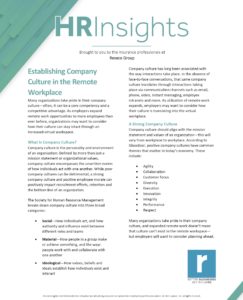 Many organizations take pride in their company culture—often, it can be a core competency and a competitive advantage.
Many organizations take pride in their company culture—often, it can be a core competency and a competitive advantage.
As employers expand remote work opportunities to more employees than ever before, organizations may want to consider how their culture can stay intact through an increased virtual workspace.
What Is Company Culture?
Company culture is the personality and environment of an organization. Defined by more than just a mission statement or organizational values, company culture encompasses the unwritten norms of how individuals act with one another. While poor company cultures can be detrimental, a strong company culture and positive employee morale can positively impact recruitment efforts, retention and the bottom line of an organization.
The Society for Human Resource Management breaks down company culture into three broad categories:
- Social—How individuals act, and how authority and influence exist between different roles and teams
- Material—How people in a group make or achieve something, and the ways people work with and collaborate with one another
- Ideological—How values, beliefs and ideals establish how individuals exist and interact
Company culture has long been associated with the way interactions take place. In the absence of face-to-face conversations, that same company culture translates through interactions taking place via communication channels such as email, phone, video, instant messaging, employee intranets and more. As utilization of remote work expands, employers may want to consider how their culture is translating into the virtual workplace.
A Strong Company Culture
Company culture should align with the mission statement and values of an organization—this will vary from workplace to workplace. According to Glassdoor, positive company cultures have common themes that matter in today’s economy. These include:
- Agility
- Collaboration
- Customer focus
- Diversity
- Execution
- Innovation
- Integrity
- Performance
- Respect
Many organizations take pride in their company culture, and expanded remote work doesn’t mean that culture can’t exist in the remote workspace— but employers will want to consider planning ahead.
Company Culture in the Remote Workplace
Effectively expanding company culture into the remote workplace is about more than just creating policies and adjusting business practices—the actions and behaviors of employees will continue to define a culture, just as in any work location.
Within the remote workplace, there are ways that employers can help expand positive attributes of a culture to those engaging in remote work. Options for employers to consider include encouraging behaviors, implementing practices and rethinking employee engagement, while keeping the following tips in mind:
- Focus on the why—An organization’s mission statement, purpose and objectives can be a source of meaning for many employees. Ensure that these goals remain at the forefront of communications.
- Prioritize collaboration—As in any workplace, employees are engaged when they are collaborating and feel as if they are part of a greater cause. While employees will be spending a significant amount of time alone, be intentional about facilitating collaboration with projects, goals and objectives.
- Rethink communications—Company culture lives through the actions of employees and how individuals communicate with each other. While word-of-mouth can no longer be the primary medium for engagement, be strategic about how different communication channels are used, such as employee intranets, social networking tools and video.
- Create opportunities for social engagement— When employees are able to engage with each other virtually, it can help build camaraderie. Many effective video platforms exist, and non- work conversations can help build team chemistry and facilitate an environment for positive interactions to take place in a remote environment.
Encouraging Behaviors
While employers can implement policies and document expectations, it will be the choice of employees to buy-in. Encouraging positive behaviors will take more than just policies or guidelines—actions can have an immense impact. Leaders often have significant influence—and when management is living out expected behaviors each and every day, employees will feel comfortable reciprocating.
Facilitating a Strong Remote Culture
While company culture will be defined by the way in which individuals interact, organizations can take steps to help facilitate an environment where a positive company culture can be established in the remote workplace.
Every organization is different and has a unique culture. Create practices and encourage behaviors that best work for your organization and are accommodating to remote and non-remote employees alike.
This HR Insights is not intended to be exhaustive nor should any discussion or opinions be construed as professional advice. © 2020 Zywave, Inc. All rights reserved.


